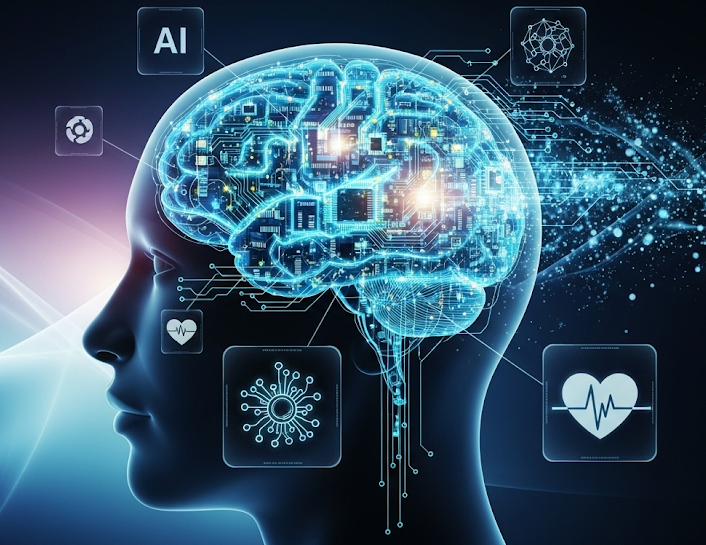Abstract
Role of Artificial Intelligence and Digital Health in Neurology.
Pages: 15-16
Category: Editorial
Published Date: 21-11-2024

Akash Verma1*
Author Affiliation:
Maidstone and Tunbridge Wells NHS Trust, UK
Keywords:
Digital Neurology, Healthcare, AI, Artificial intelligence
Abstract:
The integration of artificial intelligence (AI) and digital health solutions into neurology represents one of the most promising transformations in modern medicine [1]. As neurological disorders continue to account for a substantial burden of disease worldwide, the convergence of advanced computational tools, digital monitoring systems, and patient-centered health technologies offers the opportunity to redefine how neurological care is delivered, monitored, and optimized [2].
AI in Diagnosis and Prognosis
One of the most impactful applications of AI in neurology lies in diagnostic imaging and predictive analytics [3]. Machine learning algorithms are now capable of analyzing brain magnetic resonance imaging (MRI) and computed tomography (CT) scans to detect subtle pathological features that may be overlooked by the human eye. For example, convolutional neural networks have been trained to identify early-stage Alzheimer’s disease by detecting hippocampal atrophy patterns, enabling diagnosis years before clinical symptoms manifest [4]. Similarly, AI systems are being applied to detect ischemic stroke with remarkable speed and accuracy, facilitating rapid triage in emergency settings [5]. These tools not only reduce diagnostic delays but also enhance prognostic predictions by integrating multimodal datasets such as neuroimaging, genetics, and clinical history [6].
Digital Biomarkers and Remote Monitoring
Beyond diagnosis, digital health tools are transforming how neurologists monitor disease progression. Wearable devices, smartphones, and sensor-based platforms provide continuous, real-world data on motor activity, speech, gait, and sleep quality [7]. In Parkinson’s disease, accelerometer-based wristbands can quantify tremors and bradykinesia, while voice analysis apps detect subtle speech impairments associated with disease progression. Similarly, in multiple sclerosis, smartphone-based assessments of hand dexterity and balance allow clinicians to remotely track functional decline. These digital biomarkers provide granular, objective data that complement clinic-based assessments, enabling earlier therapeutic adjustments and more personalized care [8].
Telemedicine and Access to Care
The COVID-19 pandemic accelerated the adoption of telemedicine, highlighting its role in neurology where access to specialists is often limited. Digital platforms have allowed neurologists to assess stroke recovery, perform cognitive testing, and deliver psychiatric support virtually. For patients in remote or underserved regions, tele-neurology bridges geographic barriers and reduces waiting times for specialist consultations. Moreover, integration of AI into telemedicine platforms—for example, automated triaging systems or AI-assisted neurological examinations—enhances efficiency and clinical decision-making [3].
AI in Clinical Research and Therapeutics
The role of AI is also expanding into clinical trial design and therapeutic discovery. By mining large-scale datasets, AI can identify potential drug targets, predict treatment responses, and stratify patients for clinical trials. In epilepsy research, AI algorithms analyzing electroencephalography (EEG) data have shown promise in predicting seizure onset, paving the way for precision medicine interventions [5]. Likewise, digital therapeutics such as smartphone-based cognitive training programs or virtual reality for neurorehabilitation are emerging as adjunctive treatment modalities validated through clinical research [6].
Ethical and Practical Considerations
Despite these advances, significant challenges must be addressed for widespread adoption. Data privacy remains a paramount concern, particularly when sensitive neurological data such as brain scans or genetic information are collected and stored digitally [2]. Regulations such as the General Data Protection Regulation (GDPR) in Europe emphasize the importance of safeguarding patient confidentiality, but global standards remain fragmented. Additionally, algorithmic transparency or the “black box” problem of AI—poses ethical dilemmas when clinical decisions are based on models whose reasoning cannot be easily explained [7].
Another critical concern is health equity. Many digital health tools are developed and validated in high-income countries, raising questions about their applicability in resource-limited settings. Without deliberate efforts to ensure inclusivity, there is a risk of widening the digital divide, leaving vulnerable populations without access to these innovations [8]. Therefore, collaboration among clinicians, engineers, policymakers, and patient advocacy groups is essential to ensure equitable deployment of AI and digital health tools [4].
The Future of Neurology with AI and Digital Health
Looking forward, the synergy of AI and digital health promises to enable precision neurology where diagnosis, treatment, and monitoring are tailored to the individual patient in real time [1]. Integration of multimodal data streams including genetics, lifestyle factors, imaging, and wearable-derived biomarkers will facilitate holistic, personalized care [6]. Furthermore, advances in natural language processing may soon enable AI systems to analyze patient speech during clinical encounters, automatically generating clinical documentation and identifying cognitive or psychiatric symptoms [3].
In neurorehabilitation, AI-guided robotics and virtual reality programs are already demonstrating improved motor recovery in stroke patients [5]. Similarly, predictive analytics may allow proactive interventions for patients at risk of relapse in conditions such as multiple sclerosis or schizophrenia [7]. The combination of continuous patient-generated data with clinician oversight will move neurology from a reactive to a proactive discipline, focusing on prevention and early intervention rather than late-stage management [8].
Conclusion
In conclusion, the integration of AI and digital health into neurology represents a paradigm shift with profound implications for clinical practice, research, and patient care [2]. While challenges related to privacy, ethics, and access remain, the potential benefits including earlier diagnosis, continuous monitoring, personalized treatment, and broader access to care are undeniable. The future of neurology will not be shaped by technology alone but by how effectively neurologists, patients, and society embrace and guide these innovations [4]. Responsible adoption will require interdisciplinary collaboration, robust regulatory frameworks, and a steadfast commitment to patient-centered care [1].